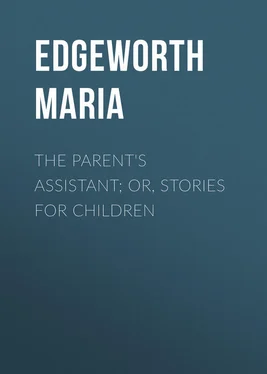Maria Edgeworth - The Parent's Assistant; Or, Stories for Children
Здесь есть возможность читать онлайн «Maria Edgeworth - The Parent's Assistant; Or, Stories for Children» — ознакомительный отрывок электронной книги совершенно бесплатно, а после прочтения отрывка купить полную версию. В некоторых случаях можно слушать аудио, скачать через торрент в формате fb2 и присутствует краткое содержание. Издательство: Иностранный паблик, Жанр: foreign_antique, foreign_prose, foreign_children, на английском языке. Описание произведения, (предисловие) а так же отзывы посетителей доступны на портале библиотеки ЛибКат.
- Название:The Parent's Assistant; Or, Stories for Children
- Автор:
- Издательство:Иностранный паблик
- Жанр:
- Год:неизвестен
- ISBN:нет данных
- Рейтинг книги:5 / 5. Голосов: 1
-
Избранное:Добавить в избранное
- Отзывы:
-
Ваша оценка:
- 100
- 1
- 2
- 3
- 4
- 5
The Parent's Assistant; Or, Stories for Children: краткое содержание, описание и аннотация
Предлагаем к чтению аннотацию, описание, краткое содержание или предисловие (зависит от того, что написал сам автор книги «The Parent's Assistant; Or, Stories for Children»). Если вы не нашли необходимую информацию о книге — напишите в комментариях, мы постараемся отыскать её.
The Parent's Assistant; Or, Stories for Children — читать онлайн ознакомительный отрывок
Ниже представлен текст книги, разбитый по страницам. Система сохранения места последней прочитанной страницы, позволяет с удобством читать онлайн бесплатно книгу «The Parent's Assistant; Or, Stories for Children», без необходимости каждый раз заново искать на чём Вы остановились. Поставьте закладку, и сможете в любой момент перейти на страницу, на которой закончили чтение.
Интервал:
Закладка:
Rose pushed the money towards her; but just then, recollecting that she was acting for others more than for herself, and doubting whether she had full powers to conclude such an extravagant bargain, she gathered up the public treasure, and with newly-recovered prudence observed that she must go back to consult her friends. Her generous little friends were amazed at Barbara's meanness, but with one accord declared that they were most willing, for their parts, to give up every farthing of the money. They all went to Susan in a body, and told her so. 'There's our purse,' said they; 'do what you please with it.' They would not wait for one word of thanks, but ran away, leaving only Rose with her to settle the treaty for the guinea-hen.
There is a certain manner of accepting a favour, which shows true generosity of mind. Many know how to give, but few know how to accept a gift properly. Susan was touched, but not astonished, by the kindness of her young friends, and she received the purse with as much simplicity as she would have given it.
'Well,' said Rose, 'shall I go back for the guinea-hen?' 'The guinea-hen!' said Susan, starting from a reverie into which she had fallen, as she contemplated the purse. 'Certainly I do long to see my pretty guinea-hen once more; but I was not thinking of her just then – I was thinking of my father.'
Now Susan had heard her mother often, in the course of this day, wish that she had but money enough in the world to pay John Simpson for going to serve in the militia instead of her husband. 'This, to be sure, will go but a little way,' thought Susan; 'but still it may be of some use to my father.' She told her mind to Rose, and concluded by saying, decidedly, that 'if the money was given to her to dispose of as she pleased, she would give it to her father.'
'It is all yours, my dear good Susan,' cried Rose, with a look of warm approbation. 'This is so like you! – but I'm sorry that Miss Bab must keep your guinea-hen. I would not be her for all the guinea-hens, or guineas either, in the whole world. Why, I'll answer for it, the guinea-hen won't make her happy, and you'll be happy even without; because you are good. Let me come and help you to-morrow,' continued she, looking at Susan's work, 'if you have any more mending work to do – I never liked work till I worked with you. I won't forget my thimble or my scissors,' added she, laughing – 'though I used to forget them when I was a giddy girl. I assure you I am a great hand at my needle, now – try me.'
Susan assured her friend that she did not doubt the powers of her needle, and that she would most willingly accept of her services, but that unluckily she had finished all her needlework that was immediately wanted.
'But do you know,' said she, 'I shall have a great deal of business to-morrow; but I won't tell you what it is that I have to do, for I am afraid I shall not succeed; but if I do succeed, I'll come and tell you directly, because you will be so glad of it.'
Susan, who had always been attentive to what her mother taught her, and who had often assisted her when she was baking bread and cakes for the family at the Abbey, had now formed the courageous, but not presumptuous, idea that she could herself undertake to bake a batch of bread. One of the servants from the Abbey had been sent all round the village in the morning in search of bread, and had not been able to procure any that was tolerable. Mrs. Price's last baking failed for want of good barm. She was not now strong enough to attempt another herself; and when the brewer's boy came with eagerness to tell her that he had some fine fresh yeast, she thanked him, but sighed, and said it would be of no use to her. Accordingly she went to work with much prudent care, and when her bread the next morning came out of the oven, it was excellent; at least her mother said so, and she was a good judge. It was sent to the Abbey; and as the family there had not tasted any good bread since their arrival in the country, they also were earnest and warm in its praise. Inquiries were made from the housekeeper, and they heard, with some surprise, that this excellent bread was made by a young girl only twelve years old.
The housekeeper, who had known Susan from a child, was pleased to have an opportunity in speaking in her favour. 'She is the most industrious little creature, ma'am, in the world,' said she to her mistress. 'Little I can't so well call her now, since she's grown tall and slender to look at; and glad I am she is grown up likely to look at; for handsome is that handsome does; she thinks no more of her being handsome than I do myself; yet she has as proper a respect for herself, ma'am, as you have; and I always see her neat, and with her mother, ma'am, or fit people, as a girl should be. As for her mother, she dotes upon her, as well she may; for I should myself if I had half such a daughter; and then she has two little brothers; and she's as good to them, and, my boy Philip says, taught 'em to read more than the schoolmistress, all with tenderness and good nature; but I beg your pardon, ma'am, I cannot stop myself when I once begin to talk of Susan.'
'You have really said enough to excite my curiosity,' said her mistress; 'pray send for her immediately; we can see her before we go out to walk.'
The benevolent housekeeper despatched her boy Philip for Susan, who never happened to be in such an untidy state as to be unable to obey a summons without a long preparation. She had, it is true, been very busy; but orderly people can be busy and neat at the same time. She put on her usual straw hat, and accompanied Rose's mother, who was going with a basket of cleared muslin to the Abbey.
The modest simplicity of Susan's appearance, and the artless good sense and propriety of the answers she gave to all the questions that were asked her, pleased the ladies at the Abbey, who were good judges of character and manners.
Sir Arthur Somers had two sisters, sensible, benevolent women. They were not of that race of fine ladies who are miserable the moment they come to the country ; nor yet were they of that bustling sort, who quack and direct all their poor neighbours, for the mere love of managing, or the want of something to do. They were judiciously generous; and whilst they wished to diffuse happiness, they were not peremptory in requiring that people should be happy precisely their own way. With these dispositions, and with a well-informed brother, who, though he never wished to direct, was always willing to assist in their efforts to do good, there were reasonable hopes that these ladies would be a blessing to the poor villagers amongst whom they were now settled.
As soon as Miss Somers had spoken to Susan, she inquired for her brother; but Sir Arthur was in his study, and a gentleman was with him on business.
Susan was desirous of returning to her mother, and the ladies therefore would not detain her. Miss Somers told her, with a smile, when she took leave, that she would call upon her in the evening at six o'clock.
It was impossible that such a grand event as Susan's visit to the Abbey could long remain unknown to Barbara Case and her gossiping maid. They watched eagerly for the moment of her return, that they might satisfy their curiosity. 'There she is, I declare, just come into her garden,' cried Bab; 'I'll run in and get it all out of her in a minute.'
Bab could descend, without shame, whenever it suited her purposes, from the height of insolent pride to the lowest meanness of fawning familiarity.
Susan was gathering some marigolds and some parsley for her mother's broth.
'So, Susan,' said Bab, who came close up to her before she perceived it, 'how goes the world with you to-day?' 'My mother is rather better to-day, she says, ma'am – thank you,' replies Susan, coldly but civilly. ' Ma'am! dear, how polite we are grown of a sudden!' cried Bab, winking at her maid. 'One may see you've been in good company this morning – hey, Susan? Come, let's hear about it.' 'Did you see the ladies themselves, or was it only the housekeeper sent for you?' said the maid. 'What room did you go into?' continued Bab. 'Did you see Miss Somers, or Sir Arthur?' 'Miss Somers.' 'La! she saw Miss Somers! Betty, I must hear about it. Can't you stop gathering those things for a minute and chat a bit with us, Susan?' 'I can't stay, indeed, Miss Barbara; for my mother's broth is just wanted, and I'm in a hurry.' Susan ran home.
Читать дальшеИнтервал:
Закладка:
Похожие книги на «The Parent's Assistant; Or, Stories for Children»
Представляем Вашему вниманию похожие книги на «The Parent's Assistant; Or, Stories for Children» списком для выбора. Мы отобрали схожую по названию и смыслу литературу в надежде предоставить читателям больше вариантов отыскать новые, интересные, ещё непрочитанные произведения.
Обсуждение, отзывы о книге «The Parent's Assistant; Or, Stories for Children» и просто собственные мнения читателей. Оставьте ваши комментарии, напишите, что Вы думаете о произведении, его смысле или главных героях. Укажите что конкретно понравилось, а что нет, и почему Вы так считаете.












